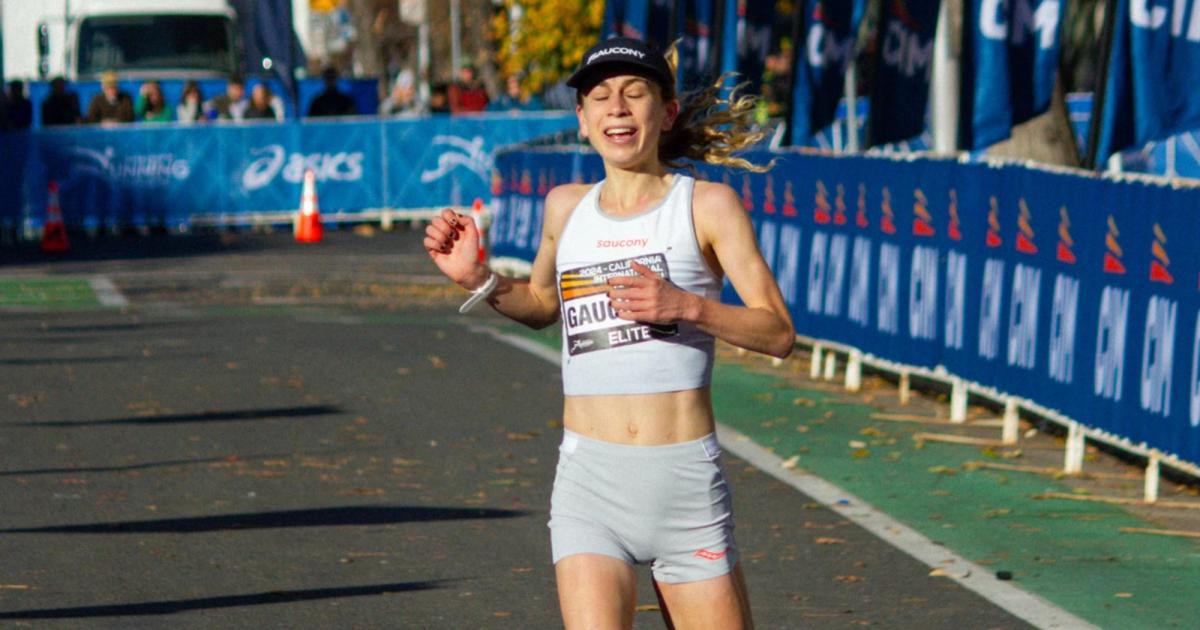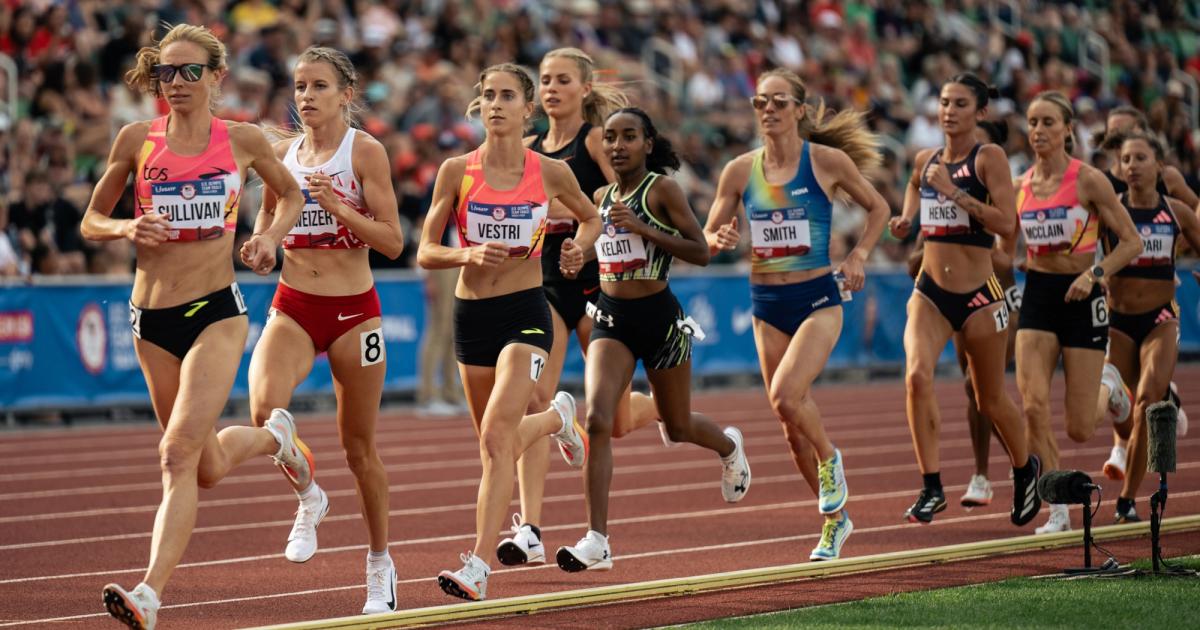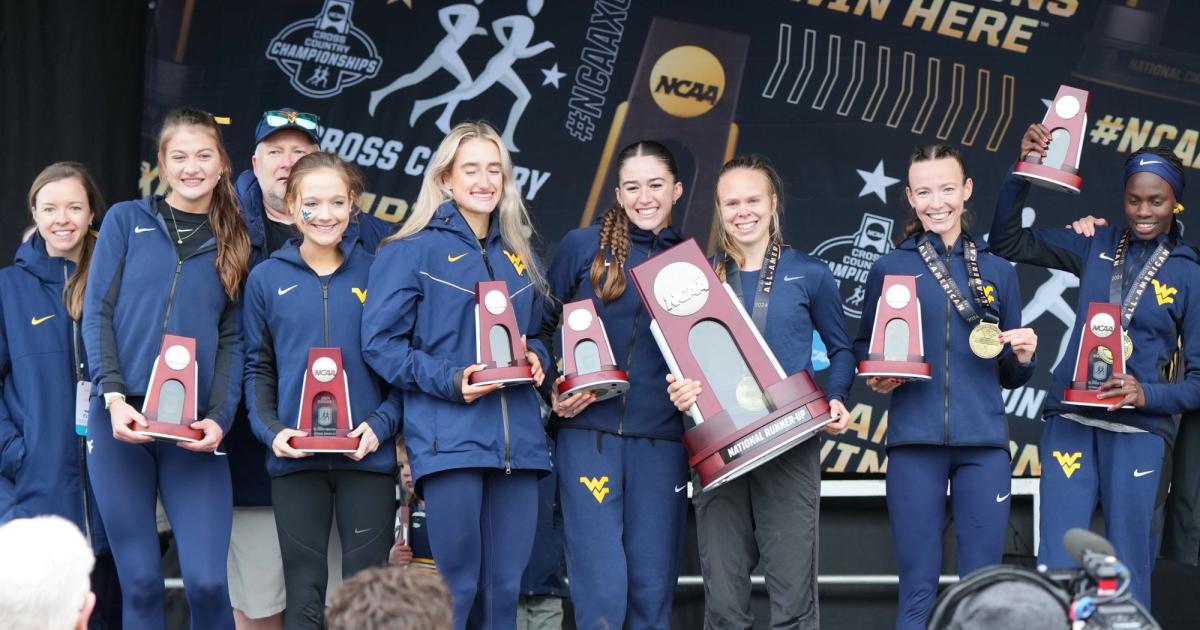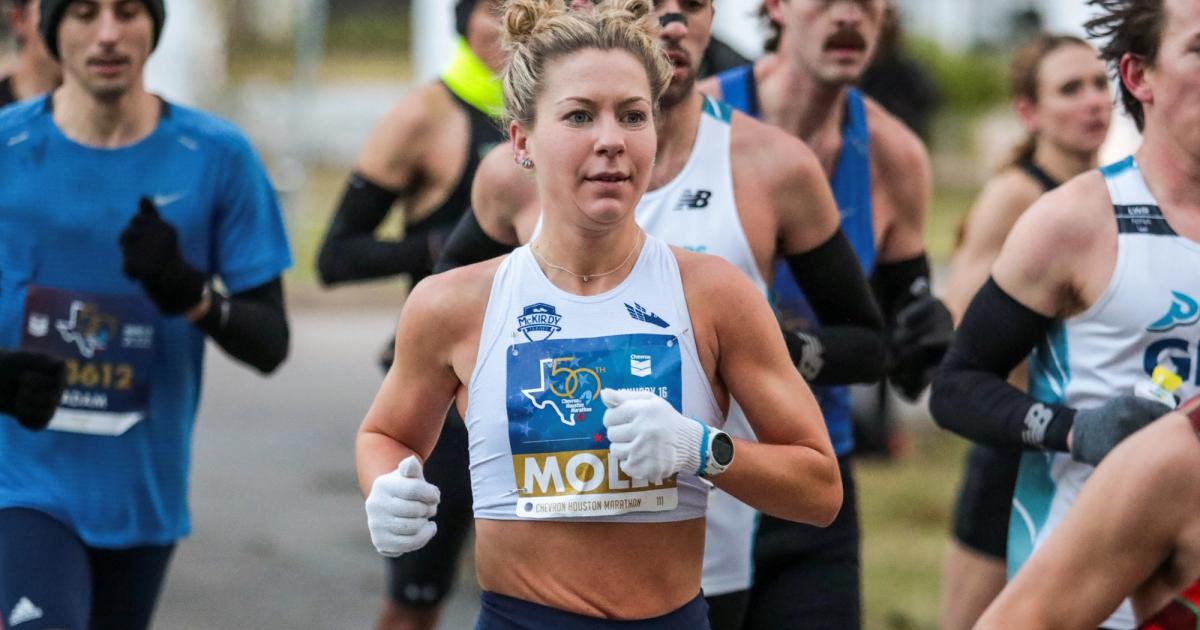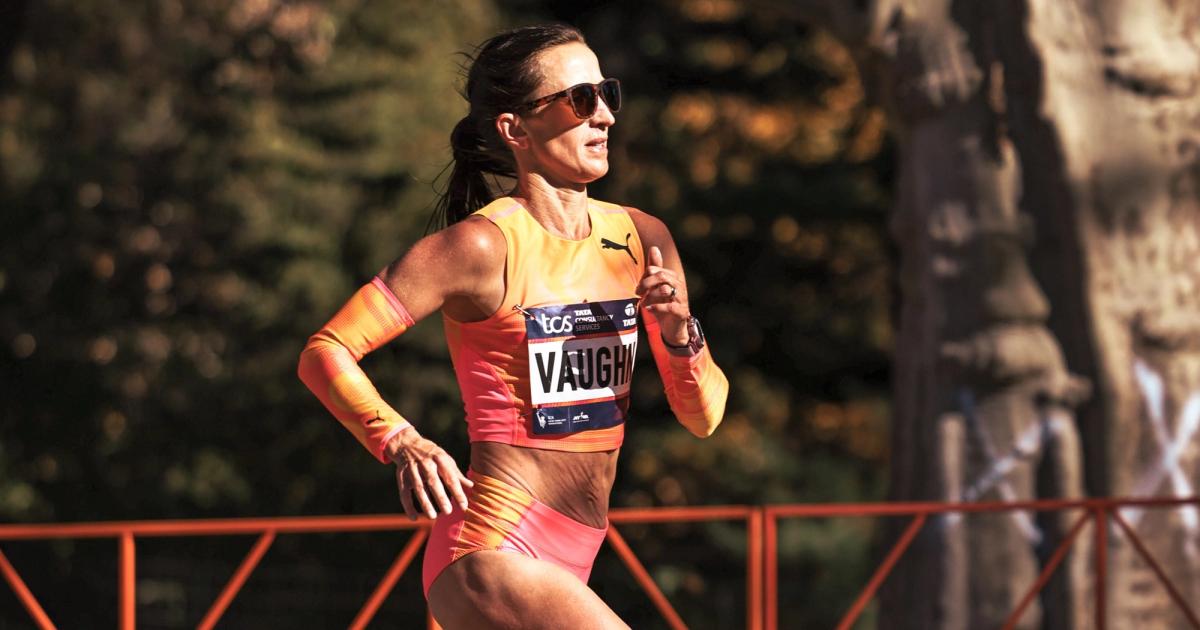By Jasmine Fehr
December 12, 2024
"I'm at the point where I'm wondering if I can compete with some of the best of the best. To get to that point, I need to get in more reps. I think that will drag me along to some faster times."
One of the biggest stories to come from last weekend’s California International Marathon was Jackie Gaughan’s 2:24:40 runner-up finish. She slashed three minutes off her former personal best of 2:27:08 – set at the 2023 Berlin Marathon – and nearly caught British Olympian Calli Thackery-Hauger over the final miles.
Jackie opened the first half of her race in 1:14:19 before picking up the pace to run a huge negative split, clocking 1:10:21 for the second half. Her final 11 miles were completed at an average clip of 5:18 per mile: 2:19 marathon pace.
Shortly before CIM, Jackie announced signing a professional contract with Saucony. Even though she’s now supported as a pro athlete, Jackie will continue to work full-time as a financial analyst in Boston.
In our conversation, Jackie breaks down her race, shares about dialing in on mid-race fueling for the first time, how she balances the demands of her job with running 120 miles per week, and her goals looking ahead to 2025 and beyond.
Jackie also reflects on her post-collegiate journey – from running for fun after graduating from Notre Dame to emerging as a top runner in the American marathon scene. She also discusses her mindset and her “why” for running.
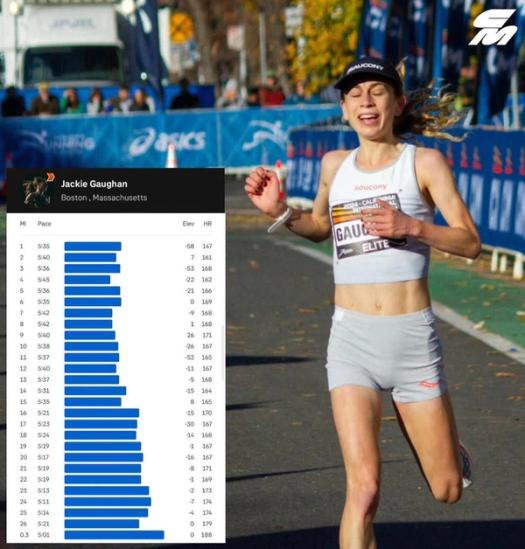
The following has been edited lightly for length and clarity.
Jasmine Fehr: You just finished runner-up at CIM in a huge marathon personal best of 2:24:40. Now that you've had a few days to reflect, how are you feeling?
Jackie Gaughan: I'm really excited about it! I kind of surprised myself out there. I feel like everyone is just trying to see how much faster they can go and that's what's so exciting about the marathon. I’m grateful for ending the year with a really positive experience.
Can you walk us through your race and how you were able to get faster and faster throughout it?
I ran the Chicago Marathon in October. That was my mission all summer and fall: to have a great performance there. I'm really grateful for the opportunity to be a part of that field, but I was very disappointed that I didn't have the performance I wanted. I felt really confident going in, but I got to mile 17 or 18 and everything kind of fell apart. I hit that famous wall in the marathon.
Looking back on that race, I tried to evaluate after what I could have done better. Utilizing fueling was something I had never really done in a marathon – mid-race fueling. My thought process with running and my philosophy has always been to not overthink things and to just do a lot of things by feel. I tend to do a lot of workouts by feel and I think I have good intuition.
But as far as mid-race marathon fueling, you can't really go by feel with it. You really need to plan and think about it. I took some time to do research on it and tried to talk to as many people as I could to hear about what they utilize. My goal was to stop at every station and get in 60 to 80 carbs an hour. I was hoping that would make a difference and was curious to see how much better I could feel the second half.
I went in with a conservative time goal and I think the goal of the race was to finish with a smile on my face and mend that marathon scar [from Chicago].
"My philosophy has always been to not overthink things and to just do a lot of things by feel. I tend to do a lot of workouts by feel and I think I have good intuition."
Your first half was 1:14 and then you closed down the second half in 1:10. Was speeding up based on intuition? How did you decide to pick it up and really close down those final miles?
I didn't want to go out too aggressively. Honestly, the time between Chicago and CIM, workouts weren't really clicking. I didn't really have the confidence going in. I just started with a great pack and felt comfortable there. Then I went through the halfway split and thought, ‘I'm feeling pretty good.’
My plan was if I was pushing the edge, I'd just try to maintain that. But I felt pretty good, so I tried to pick it up a little bit. I didn't realize how much I had picked it up and tried not to think about it too much and just keep rolling with it.
It was a shock to hear around 20 miles someone mentioning to me that Calli [Thackery-Hauger] was relatively close. I think that helped pull me along to an even faster time those last six miles.
Was there a point in those final miles where you thought you might take the win?
That's what's exciting about marathoning. This is the first situation where I've been in a situation like that. I think that the mid-race fueling really made an impact – a bigger impact than I was expecting. It kind of felt like putting on super shoes for the first time. I really didn't know to what capacity I could keep pushing and definitely was a little bit nervous about how much harder I could push. There's not many instances where marathons are that close, so that made it really fun.
You mentioned that you haven't done a ton of fueling during past marathons and that you did research heading into this one to dial that in. Do you have a coach that helps you with that? What does that setup look like for you?
I owe it to a lot of people for my development as an athlete through training. It's such a mental sport, too. You really have to lean on a lot of people. My college coach is still someone that, whether I have a bad race or a good race, he's the first person I'll call.
I was on the Green Racing Project, a Tracksmith-sponsored team, up until signing with Saucony. I owe a lot of my transition to the marathon to [coach Jamie Norton].
You recently announced that you signed with Saucony. Huge congrats! Right now, you're working full-time. Now that you have a pro contract, does that change your workload at all? Or do you plan on continuing to work full-time?
Coming out of college, I wasn't really expecting to continue running at a competitive level – but I moved to Boston, joined a running club to make new friends, and was really inspired by a group of girls here in Boston who were training to qualify for the Olympic Trials. I saw how much fun they were having with this endeavor and how it was a really cool goal while also being able to have a lot of fun with it too. I think that inspired me. I got back into racing while still maintaining a full work schedule.
I’m transitioning into a new role in January but will still have the same intensity with my career. I'm an all-in type of person. I think there's diminishing returns with being all-in on whatever goals you're trying to achieve, so I think having both career goals and running goals balances me out a little bit.
To a certain extent, it's easy to overtrain with marathon training. But having a busy day with my career definitely allows me to balance my training a little better. It's almost impossible to overtrain.
"I'm an all-in type of person. I think there's diminishing returns with being all-in on whatever goals you're trying to achieve, so I think having both career goals and running goals balances me out a little bit."
In Saucony’s announcement, they shared that you're running around 120 miles a week. How are you balancing that with your work schedule? Are you running before and after work?
I typically get up very early in the morning. There's a whole contingent of people in Boston who work full-time and do similar things where they get up early. Sometimes they run after work too.
Some people like to relax by watching TV. But for me, I think going for a run is my way of relaxing and taking a deep breath. But I do have a strict rule: I don't double on Fridays, Saturdays, or Sundays. I work during the week and then maintain some fun and social life on the weekends.
Something else you mentioned was that coming out of college, you wanted to continue running but more for fun and maybe not take it to the next level. What helped you improve so much?
I think my body just responded really well to marathon training and the mileage. To a certain extent, it doesn't make sense to me how I can handle the mileage, but I'm just trying to not think too much about it.
I think just consistency too. I sometimes get caught up in this idea that after every season and race, I have to do something better or different with training to get better for the next race, but I think marathon training in particular compounds on itself.
I’m just trying to stay healthy and stay consistent with things. I don't feel like I really hit a lot of home run workouts. I’m just trying to stay in motion every day – an object in motion stays in motion. I’m just trying to stay positive and consistent with training.
"I sometimes get caught up in this idea that after every season and race, I have to do something better or different with training to get better for the next race, but I think marathon training in particular compounds on itself."
Looking ahead to 2025, what are your goals and what races do you have on the calendar next?
I'm going to race the Half [Marathon] Championship in Atlanta in March and I’m hoping to race a spring marathon. I think my goal for 2025 is to put myself in competitive racing situations, get outside of my comfort zone, and become a better racer. I think that's something I can work on.
I've been very focused on individual goals and personal growth and now I'm at the point where I'm wondering if I can compete with some of the best of the best. To get to that point, I need to get in more reps. I think that will drag me along to some faster times.
You’re on the younger side for marathoners at just 25-years-old. How excited does that get you for your running career?
It makes me really excited! I think it's also very inspiring how a lot of these marathoners are able to balance different transitions in life and different goals. I definitely don't want to get ahead of myself. There's still a lot of time to grow and get better.
I was drawn to marathon training because it's one of those unique events where you can balance a lot of other goals in life outside of running. I try to just pick two days a week to run hard and then just run a lot of miles. It's not rocket science and you don't have to race quite as often either. I think it bodes well with handling other goals in life, too.
"I was drawn to marathon training because it's one of those unique events where you can balance a lot of other goals in life outside of running. I try to just pick two days a week to run hard and then just run a lot of miles."
When you say it allows you to pursue other goals, what does that look like for you? You have your big running goals of course, but what goals do you have outside of the sport?
Before my buildup for the half marathon and marathon this spring, I'm building up for the CFA [The Chartered Financial Analyst – a professional certification that requires three tests] in February. I'm someone who's very career driven outside of running.
I think just being a good friend, a good girlfriend, a good sister, and a good coworker is important too. Being a runner is only part of who I am. It’s something I really enjoy though.
What is your parting advice that you want to leave with our readers?
I've run into a lot of times where I struggled with running and I think during those times it's important to come back to your why – why you're running and just learning to enjoy the process. I think if you're enjoying the process, that can lead to bigger and bigger results. Some of my best marathons have happened after training cycles where I just had the most fun and really enjoyed the day-to-day process.
Just make the training cycle a lot of fun and keep remembering your why.
"I think if you're enjoying the process, that can lead to bigger and bigger results. Some of my best marathons have happened after training cycles where I just had the most fun and really enjoyed the day-to-day process."
You mentioned that it’s important to come back to your why – what’s your why?
I'm just curious to see how good I can be. I think even in middle school and high school, I used to go out and do these long runs on the weekend and would try to see how much faster I could get with each one throughout the season.
I remember my parents used to think I was crazy, like, ‘Why are you doing this to yourself every Sunday morning? It's ten degrees and you're out there on the roads for an hour and a half.’ I think it’s just that curiosity of seeing how much faster I can get and how much I can better myself.
___________________
Keep up with all things track and field by following us across Instagram, X, Bluesky, Threads, and YouTube. Catch the latest episodes of the CITIUS MAG Podcast on Spotify and Apple Podcasts. For more, subscribe to The Lap Count and CITIUS MAG Newsletter for the top running news delivered straight to your inbox.
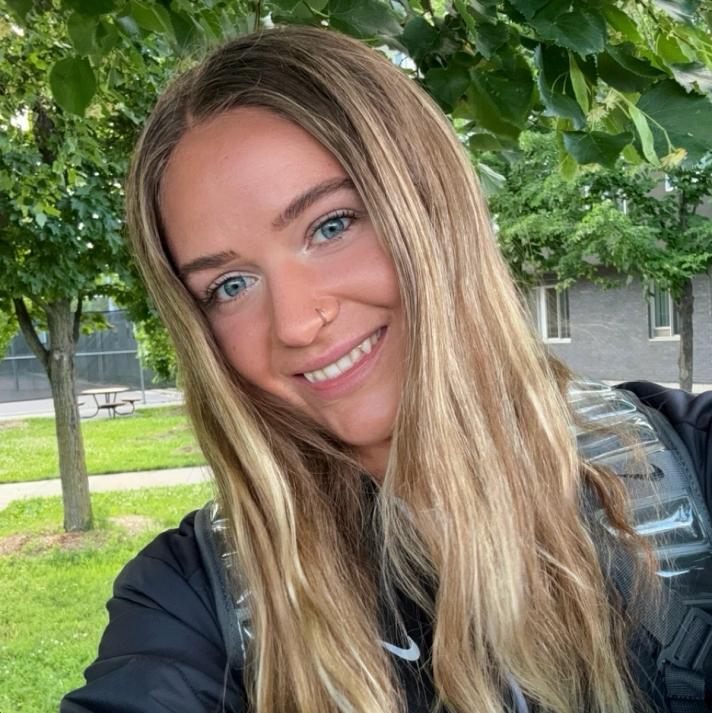
Jasmine Fehr
Jasmine Fehr produces the CITIUS MAG Podcast, manages our website, and shares content across our socials. She’s a marathon runner training in Flagstaff, Arizona. Her collegiate running career spanned the University of Portland and the University of Tennessee, where she earned a Bachelor’s degree in Psychology and Master’s degree in Communications.
